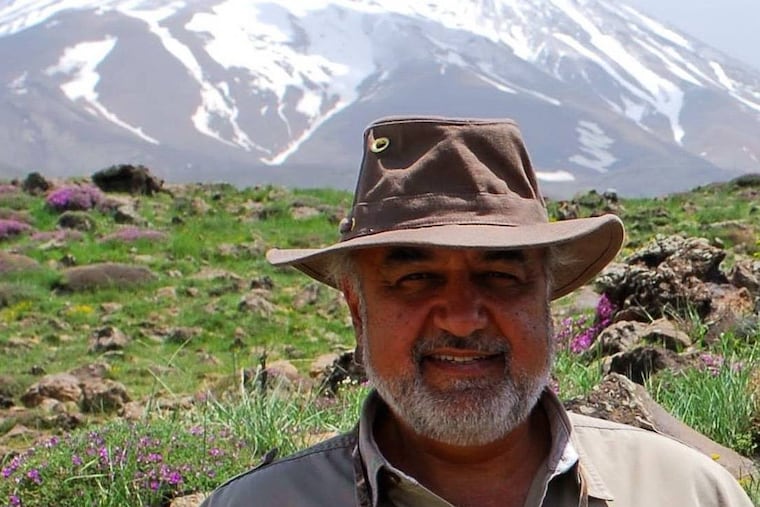Iran’s shame: How saving cheetahs got environmentalists 10-year sentences in Tehran | Trudy Rubin
Despite protests of scientists worldwide, six noted wildlife conservationists, including a dual U.S.-U.K. citizen, were given long prison terms in Iran on false charges of spying.

Their crime was their passion to save endangered cheetahs in the Iranian wilderness.
Apparently, that was too much for Iran’s judiciary and the Islamic Revolutionary Guard Corps. This week, an Iranian appeals court upheld lengthy prison sentences against six wildlife conservationists detained since January 2018.
They included Morad Tahbaz, 64, a U.S. citizen (and one of five American hostages who are being held or have disappeared in Iran’s prisons).
These outrageous sentences should be loudly protested by environmental groups and conservationists worldwide.
What’s so bizarre is that these environmentalists were working closely with Iran’s Department of Environment and had been granted all necessary permits. The charges of spying were refuted by three major Iranian state agencies, including the Intelligence Ministry. But the charges were pursued by Iran’s Revolutionary Guards and upheld by their judicial allies.
This story shames the Islamic Republic (as does Tehran’s much broader crackdown on civil society). “Iran’s judiciary and Revolutionary Guards have declared conservation a crime by sentencing these peaceful wildlife conservationists to lengthy prison terms for doing their jobs,” says the Center for Human Rights in Iran’s executive director, Hadi Ghaemi. “Iran desperately needs wildlife and climate experts to help guide the government out of the country’s environmental crisis that mismanagement and climate change have produced.”
Instead, they throw dedicated conservationists in jail.
Consider the story of Tahbaz, a dual U.S.-U.K. citizen and real estate developer in Connecticut. He returned to Iran on family business several years ago and decided to pursue a passionate interest in endangered species by cofounding the Persian Wildlife Heritage Foundation (PWHF) with 63-year-old Iranian Canadian professor Kavous Seyed-Emami.
The group had a special interest in saving the critically endangered Asiatic cheetah, of whom only around 50 survive, along with other threatened species. They were totally apolitical and focused on their mission.
» READ MORE: After Soleimani's death, what's the strategy? | Trudy Rubin
They built strong relationships with Iranian government agencies, especially the Department of Environment, and also with the United Nations. They obtained all necessary government permits for the special camera traps necessary to amass data on endangered animals in the wilderness.
Their work was so admired that, with the foundation’s help, Iran’s national soccer team designed special jerseys with cheetahs emblazoned on them, which they wore to the 2014 World Cup in recognition of the importance of saving the animals.
Yet in January 2018, Tahbaz was arrested on one of his periodic visits to Iran, along with eight current and former PWHF staffers. They were accused of using the cameras for spying (experts point out these low-resolution camera traps are only suitable for tracking the movement of animals).
Tahbaz has been suffering from cancer and cannot get the medical supervision he needs while in a prison cell.
As for Seyed-Emami, he was found dead in his cell 17 days after his arrest while he was under interrogation. His jailors claimed it was “suicide,” but family members dispute this. They were not permitted to conduct an independent autopsy.
Meanwhile, Niloufar Bayani, who also received a 10-year sentence, refused to attend several court sessions, claiming she had been tortured into confessing.
She had been a research fellow with the Wildlife Conservation Society and encouraged U.N. environment projects in Afghanistan, the Democratic Republic of the Congo, Sudan, and Haiti. But she returned to Iran, her birthplace, to join the Persian Wildlife Heritage Foundation and try to protect her country’s environment. This was her reward.
The environmentalists have become trapped in the ongoing political war between the Revolutionary Guards and the government of Iranian President Hassan Rouhani.
The deep tensions between Washington and Tehran play a role in Iran’s domestic struggles, as with the U.S. sanctions and the killing of Qassem Soleimani. But the struggle is essentially internal, about whether Iran will open itself to the world and focus on vital reforms, or concentrate on its imperial ambitions in the region, led by the Revolutionary Guards.
» READ MORE: The war between U.S. and Iran isn't over | Trudy Rubin
Environmentalism is global — trying to protect air, water, and species — and that makes the Revolutionary Guards (who have vast economic interests in Iran) very nervous. They are pushing back against Iran’s civil society and youth.
In 2018, 7,000 civil society activists, including students, journalists, women’s rights activists, lawyers, and trade unionists, were arrested. Their numbers included at least 63 environmental activists and researchers, including the dedicated group from the Persian Wildlife Heritage Foundation.
Iran’s regime is alienating its younger generation. This is why the turnout for parliamentary elections this week (from which virtually all but hard-line candidates were excluded) will probably be very low.
The world is taking notice. Famous naturalist Jane Goodall, along with hundreds of leading environmental scientists and researchers, has protested the PWHF arrests, as has the United Nations Environment Programme. Those protests — especially from U.N. agencies — need to be much louder and more coordinated to get Tehran’s attention.
The fate of Morad Tahbaz and his dedicated colleagues will show whether Iran cares about its environmental future — or is so mired in internal warfare, it can’t be bothered to protect the nation’s animals, water, and air.